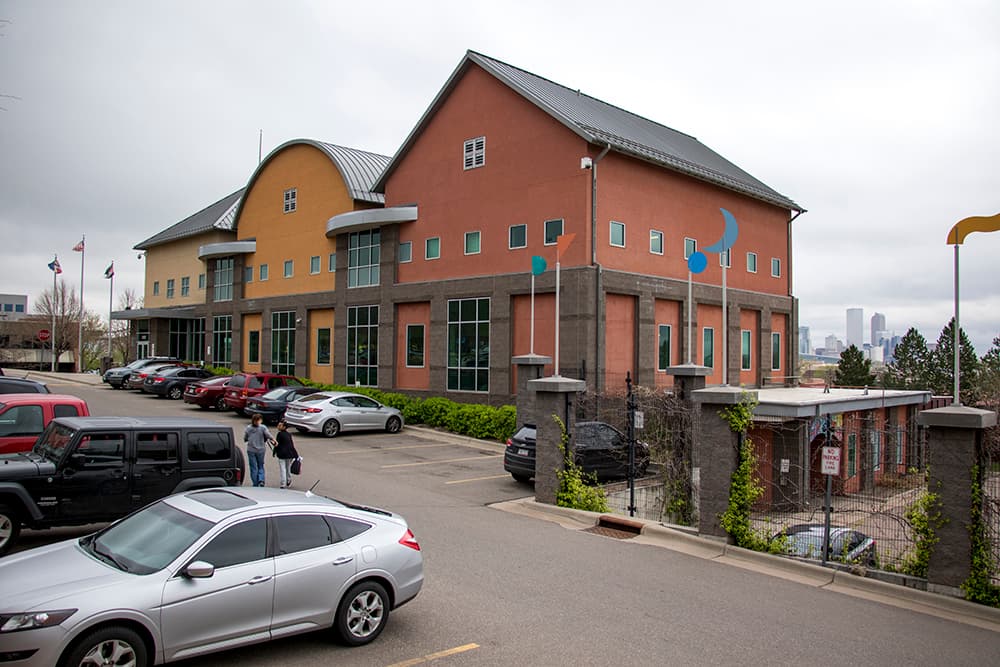
The brightly colored building off Federal and 10th Avenue has stood mostly empty for nearly two years, ever since the city closed down a facility that housed teenagers with behavioral issues.
Now, the city government plans a new use for the facility: It could become Denver's first "stabilization center," a place where homeless people could stay for several weeks as they recover from mental health crises.
"The jail and the criminal justice system is becoming the system of first resort for mental health and behavioral health," said Tyler Jaeckel, government innovation fellow with the city of Denver.
"This is trying to say, 'Here's an alternative for how we can get people on a path for longer-term sustainability.'"
But some of the people who live nearby are skeptical of the project. This week, the Sun Valley Community Coalition's members voted against the idea, though they'll reconsider it later this month. The community members don't have the power to stop the project, but their opinions could influence the Denver City Council's final decision.
What exactly is it?
City staff are calling this a "Solutions Center."
Imagine a person is having a mental health crisis on Denver's streets -- for example, they're behaving erratically, and they come into contact with a Denver police officer.
Currently, there are a few places in Denver where that person might end up. The officer might take them to jail in order to get them off the streets. That's quite often a terrible place for someone who's already in crisis. (Read about the death of Michael Marshall, a man with schizophrenia who was jailed on a minor trespassing charge.)
Alternatively, someone could be taken to a hospital for detox and emergency care.
"Those are all very short term solutions or crisis intervention only," said Nikole Bruns, interim executive director of the Office of Behavioral Health Strategies. People might also end up with a referral for treatment later at Mental Health Center of Denver.
The Solutions Center would add another option. It would include a "crisis stabilization" unit with 16 beds, where people could get treatment, medication, and referrals to other services. It also would have 30 beds where people could stay for up to 30 days as they sought housing and other treatment programs.
"If it isn’t an acute (need to) go to detox or the ER, this is that facility to provide the stabilization services," Bruns said.
A city information sheet says it would be a place "where mental health and chemical dependency assessment and treatment services such as individual and group counseling and medication therapy can be provided in a secure and therapeutic environment."
Jefferson and Arapahoe counties operate stabilization centers, but this new one's focus on homelessness would make it the "first of its kind" in the state, Jaeckel said.
Why are Sun Valley neighbors concerned?
Lisa Saenz, vice president of the Sun Valley Community Coalition, said she was waiting for more information on the facility.
"I’ve got to hear more. They didn’t give a lot about it," she said. City staff will return to present more information at the group's May 15 meeting at 1216 Decatur Street, 6 p.m., she said.
In the meantime, residents have expressed concerns about whether the treatment facility would bring a risk to the neighborhood.
"There’s lots of kids in this neighborhood. That’s the No. 1 concern I heard, just with kids being safe," Saenz said.
City staff say that the facility would not be treating the most severe cases. "If someone was truly a danger to themselves or to others, they’d be going to the hospital or a more secure facility," Jaeckel said.
And it would be very different from homeless shelters and walk-in centers, they said. Clients would only be accepted by a referral, so there would not be a reason for people to walk through the surrounding neighborhoods to seek treatment, city staff said.
Treatment at the facility would be voluntary. That also means that people could leave at will, but the city plans to keep a close watch. Exterior doors would trigger alarms and operate on a time delay, giving staff a chance to catch up to people as they leave the building.
The city has selected the Mental Health Center of Denver to operate the program. It's modeled on Seattle's Crisis Solutions Center.
The project will occupy the current building on the site, but it will be renovated. The proposal requires a rezoning and approval by the Denver City Council. If that happens, it could open next spring, staff said.
Updated to correct Nikole Bruns' job title.










